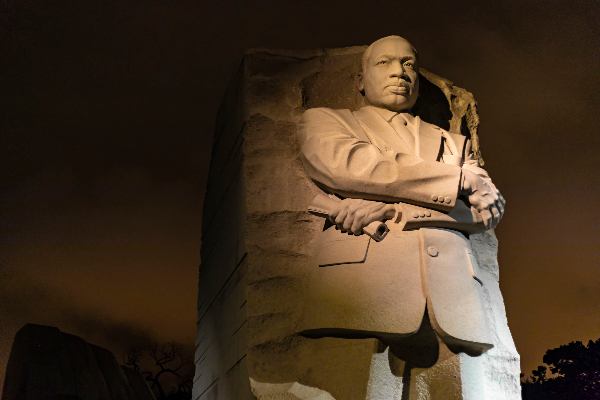“I don’t want a Black History Month. Black history is American history.” —Morgan Freeman
There are dozens of incredible Black History itineraries to learn about Civil Rights in the United States. If you are looking for a concentration of black attractions in one city you have some really good choices. Baltimore, Atlanta, Memphis, Montgomery, Washington DC and Charleston come to mind. There are additionally dozens of iconic cultural tourist attraction in Detroit Michigan. This is not a complete list of cities by any means.
Supporting Black-Owned Businesses
Seek out black-owned companies or tour guides that do history tours. Even the National Parks Service offers civil rights tours. Some include Natchez National Historical Park in Mississippi where you will learn about African enslavement and the cotton industry, Harriet Tubman Underground Railroad National Historical Park to see where she was enslaved, overcame that to rescue countless slaves to freedom on the Maryland Eastern Shore, and the Frederick Douglass National Historic Site where he lived from 1877-95 and the National Museum of African American History and Culture in Washington DC. The Civil Rights Trail covers over 100 locations across 15 states. Check out the options at www.UScivilrightstrail.com
When spending money on vacation support black-owned restaurants, entertainment facilities, and shopping for souvenirs at black-owned stores. There are resources out there with that information. For example, 303 Magazine in Denver Colorado offers a list of those businesses for Denver. Check with the visitors bureau of the destination you are visiting and ask if they have a list.
Check with visitor bureaus for Black Heritage Travel ideas or itineraries.
Some examples:
- VisitNC.com offers 10 places to explore African-American History.
- VisitSavannah.com has ideas for the Black Heritage Experience.
- VisitFlorida.com has a three day itinerary on the state’s Black Heritage Trail.
- Visitblkrva.com covers everything Black History in the Richmond, Virginia region
Civil Rights Itinerary In Alabama
The Alabama Civil Rights Trail is done over multiple days and will take you through important moments in the quest for civil rights.
Start your tour at the Birmingham Civil Rights Institute, a museum that shows the struggles of the Civil Rights Movement of the 1950s and 1960s. Across the street, visit the 16th Street Baptist Church, bombed by Klansmen in 1963, killing four little girls attending Sunday school. Catch one of their daily tours.
Walk through Kelly Ingram Park where sculptures depict the reality of the police dogs and fire hoses that were turned on demonstrators who gathered here to protest segregation laws. Dial 205-307-5455 for a free mobile audio tour in the park.
Tour historic 4th Avenue North, location of the Alabama Jazz Hall of Fame. Alabama has produced notable jazz musicians in the country such as Nat King Cole from Montgomery, and Tuscaloosa’s Dinah Washington. The first piano blues solo ever recorded was played by Birmingham-born Clarence “Pinetop” Smith. Sun Ra, whose innovative work remains celebrated worldwide, is from Birmingham. This historic district flourished in the early 1900’s for black life with their own businesses and entertainment options.
Make sure you take a break for a meal and head to Yo’ Mama’s Restaurant for their chicken and waffles.
Head to Selma and walk across the Edmund Pettus Bridge, where the civil rights march began in 1965 and where police confronted voting rights marchers on Bloody Sunday. This moment was pivotal to the Voting Rights Act of 1965.
Visit the Brown Chapel AME Church, where Dr. Martin Luther King Jr. launched the voting rights march. It is also where the marchers prepped for their march towards Montgomery. Tour the National Voting Rights Museum & Institute, which houses memorabilia honoring the attainment of the right to vote. It is located at the foot of the Edmund Pettus Bridge.
African American Education Itinerary In Washington D.C
 If you are traveling near the District of Colombia, there are dozens of Civil Rights attractions to learn about African-American history and culture. First make a stop at Anacostia Park, well known for Langston Legacy Golf Course, which was established in 1939 for African-Americans during segregation. Then, make your way over to the Carter G. Woodson National Historic Site. Catch the 45 minute guided tour Thursday thru Saturdays. This historical site was commemorated in 2006 to honor Carter G. Woodson, one of the original pioneers behind Negro History week in 1926 which turned into Black History Month every February. Another major stop on your itinerary is the Mary McLeod Bethune Council House National Historic Site. This site preserves the house, and honors the history of educator, philanthropist, and Civil Rights activist. Other major, must-see stops on your Washington D.C. itinerary should include the Dr. Martin Luther King Jr. Memorial, the National Museum of African American History and Culture, the Lincoln Memorial, and the Mitchell Jamieson Mural. The mural is located at the Udall Department of the Interior building. While you are there catch the Murals Tour which is at 2 PM on Tuesday and Thursdays. To reserve your spot call 202-208-4743
If you are traveling near the District of Colombia, there are dozens of Civil Rights attractions to learn about African-American history and culture. First make a stop at Anacostia Park, well known for Langston Legacy Golf Course, which was established in 1939 for African-Americans during segregation. Then, make your way over to the Carter G. Woodson National Historic Site. Catch the 45 minute guided tour Thursday thru Saturdays. This historical site was commemorated in 2006 to honor Carter G. Woodson, one of the original pioneers behind Negro History week in 1926 which turned into Black History Month every February. Another major stop on your itinerary is the Mary McLeod Bethune Council House National Historic Site. This site preserves the house, and honors the history of educator, philanthropist, and Civil Rights activist. Other major, must-see stops on your Washington D.C. itinerary should include the Dr. Martin Luther King Jr. Memorial, the National Museum of African American History and Culture, the Lincoln Memorial, and the Mitchell Jamieson Mural. The mural is located at the Udall Department of the Interior building. While you are there catch the Murals Tour which is at 2 PM on Tuesday and Thursdays. To reserve your spot call 202-208-4743
Civil Rights Tennessee Travel Itinerary
Of course, there are plenty Civil Rights tourist attractions in Tennessee. Begin your journey in the City of Nashville, Tennessee. Right in the City Center, be sure to visit the Civil Rights Room at the Nashville Public Library, Fifth Avenue Historic District, and the Witness Walls at the Davidson County Courthouse. Then, make your way over to Fisk University and the Clark Memorial United Methodist Church. If you are planning some time in Memphis, there are plenty of additional attractions to see there. Here, you can visit the National Civil Rights Museum at the Lorraine Motel, which is the location of Matin Luther King Jr.’s assassination. In addition, Memphis, TN is home to the Mason Temple Church of God in Christ, Beale Street Historic District, and WDIA Radio Station. Of course, these are only some of the nearby destinations to visit. For outdoor lovers, there is plenty more to experience in our Montana travel adventure guide.
Historical Travel Itinerary In Mississippi
If you are anywhere near Mississippi, consider learning about African-American history and racial justice through a cultural travel itinerary. Start off in Sumner Mississippi, just a two hour drive from Memphis, Tennessee. Here, you can find the Emmett Till Interpretive Center, located at the courthouse where Till’s murder trials took place. For $5 you can take a one hour tour. This murder in 1955 was the spark for the upcoming Civil Rights Movement. Just another 2 1/2 hours down the road is Jackson, Mississippi. In the capital city of Jackson, you can find the home where voting rights leader Medgar Evers was assassinated. Consider adding them to your Civil Rights Mississippi travel itinerary.
Kentucky Civil Rights Itinerary
Planning your Civil Rights travel itinerary, you need to plan a stop in Kentucky. There are several major cities in Kentucky for African-American education travel. Largely, many travelers visit Berea, Louisville, Russellville, and Simpsonville. In Louisville, check out the Downtown Civil Rights Trail, which commemorates the history of those who endured racial injustice and segregation in the city. Just East of Louisville and Lexington Kentucky, you will find Simpsonville. In Simpsonville, be sure to visit the Whitney M. Young Jr. Birthplace. He fought against employment discrimination in the south and was the President of the National Urban League. Just further East you will find Berea. Berea is home to Lincoln Hall at Berea College, the first higher education in the United States to educate both black and white students in an integrated setting.It was also a central location for civil rights activities. In Southern Kentucky, just outside of Bowling Green, you will arrive in Russellville. When in Russellville, be sure to check out the Alice Allison Dunnigan Statue located at the SEEK Museum. Alice was the first black female correspondent at the White House, covering the campaigns of Presidents Eisenhower and Truman. The SEEK Museum covers three generations of enslavement.
West Virginia Itinerary For Civil Rights Travel
Immediately East of Kentucky, you will run into West Virginia, another major hub of Civil Rights attractions. Visiting West Virginia, there are major sites to see in Charleston, Harpers Ferry, and Huntington. Some of the most scenic historical attractions are located in Harpers Ferry, at the Harpers Ferry National Historic Park. The National Park is home to amazing hiking trails, historic Civil War sites, and incredible artifacts. It is also where John Brown incited a slave rebellion which led to the Civil War. Continue traveling to Huntington, where you will find the Memphis Tennessee Garrison House. Then, continue to Charleston, where you can find many additional sites. In Charleston, checkout the former home of Civil Rights leader Elizabeth Harden Gilmore, The Simpson Memorial United Methodist Church, and the Garnet Adult Education Center. Garnet High School was an African-American school from 1929-56. All schools were integrated after that. Simpson was in the middle of a prosperous black community from 1914-1940. Of course, there are plenty of additional U.S. destinations to learn and experience cultural travel. To learn more, be sure to check out our ultimate guide to Native American tourism and discovering indigenous cultures.
New York Travel Itinerary For African-American Education
As you continue your Civil Rights travel, there are several sites to see in New York. If you are planning an upcoming trip to New York City, one of the most important, sacred spaces for learning about racial injustice is located right in Manhattan. The African Burial Ground National Monument is located in the Civic Center neighborhood of Lower Manhattan. The monument is the oldest and largest publicly known excavated burial ground in North America. The burial ground is home to both free and enslaved Africans from 1630-1795. This site reflects on a time when no African-Americans were permitted to be buried in Manhattan. Outside of the city, you can visit Seneca Falls, home to the Women’s Rights National Historic Park. This is where the Women’s Rights Movement began in 1848. Of course, be sure to read about any current restrictions or travel advisories in the New York Area. This way, you can avoid the most common travel mishaps on your next journey.
There are several historic sites you need to visit to learn about African-American history, culture, and injustices. These attractions even make a great stop to visit on your family vacations. There are dozens of historic attractions to learn about when visiting Alabama. If you travel to Washington D.C., there are dozens of Civil Rights attractions to learn about African- American history and culture. Then, travel to Mississippi and learn about African-American history and racial justice through a cultural travel itinerary. Next, you need to plan a stop in Kentucky. At the same time, you need to pay a visit to West Virginia, another major hub of Civil Rights attractions. As you continue your travel, there are several sites to see in New York. Consider the points mentioned above to learn about the essential Black History & Civil Rights itineraries.
Learn How I Saved Over $15,274 On Booking Flights, Hotels, & Entire Vacations
This expert guide on "Travel Hacking Tactics To Slash Vacation Costs" has personally saved me over $15,274. Within the guide, you will learn how to:

Understand Credit Report
Impact On Travel
Leverage Travel Hacking
Credit Cards
Earn Substantial Travel
Miles & Points
Maximize Credit Card
Loyalty Programs





